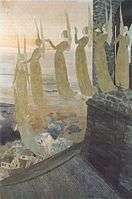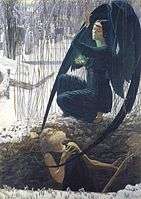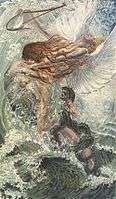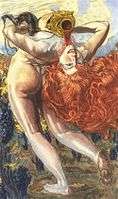Carlos Schwabe

Carlos Schwabe (July 21, 1866 – 22 January 1926) was a Swiss Symbolist painter and printmaker.
Life
Schwabe was born in Altona, Holstein, and moved to Geneva, Switzerland at an early age, where he received the Swiss nationality. After studying art in Geneva, he relocated to Paris as a young man, where he worked as a wallpaper designer, and he became acquainted with Symbolist artists. His paintings typically featured mythological and allegorical themes; as an essentially literary artist, he was much in demand as a book illustrator. He illustrated the novel Le rêve (1892) by Émile Zola, Charles Baudelaire's Les Fleurs du mal (1900), Maurice Maeterlinck's Pelléas et Mélisande (1892), and Albert Samain's Jardin de l'infante (1908). Schwabe lived in France for the rest of his life and died in Avon, Seine-et-Marne in 1926.
Work
Two distinct styles are recognized in Schwabe's art. Before 1900, Schwabe's paintings were more individual and experimental, indicating the idealism of the Symbolists; conventional, allegorical scenes from nature became more prominent in his later work. Images of women were important, sometimes representing death and suffering, other times creativity and guidance. His first wife was his model for angels and virgins, and "Death" in Death and the Grave Digger (1895) resembles her. The death of a close friend in 1894, when Schwabe was 28 years old, engendered his interest in representing death.
Schwabe created a colour lithograph for the 1892 Salon de la Rose + Croix, the first of six exhibitions organized by Joséphin Péladan that demonstrated the Rosicrucian tendencies of French Symbolism. Schwabe's poster depicted in shades of blue an initiation rite—three women ascending toward spiritual salvation—and is an exemplar of Rosicrucian art.
Gallery
 La douleur, 1893
La douleur, 1893 Cloches du soir (Evening bells, 1895)
Cloches du soir (Evening bells, 1895) Death and the Gravedigger, 1895
Death and the Gravedigger, 1895 Les Fleurs du mal, 1900
Les Fleurs du mal, 1900 l'Ame du vin, 1900
l'Ame du vin, 1900 Spleen, 1907
Spleen, 1907 Lotte, the artist's daughter, 1908
Lotte, the artist's daughter, 1908
References
- Jumeau-Lafond, Jean-David, (1994), Carlos Schwabe, symboliste et visionnaire, Paris, ACR editions.
- Clement, Russell T. et al. (2004). A Sourcebook of Gauguin's Symbolist Followers. Greenwood Publishing Group, 865–867. ISBN 0-313-31205-2.
- Jumeau-Lafond, Jean-David (2007), Painters of the soul, Tampere, Museum of Art.
- Greenspan, Taube G. "Schwabe, Carlos." In Grove Art Online. Oxford Art Online (accessed May 26, 2008).
External links
-
 Media related to Carlos Schwabe at Wikimedia Commons
Media related to Carlos Schwabe at Wikimedia Commons